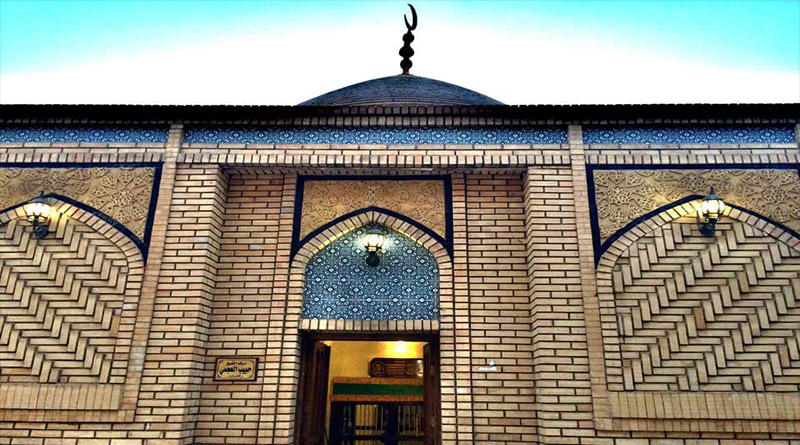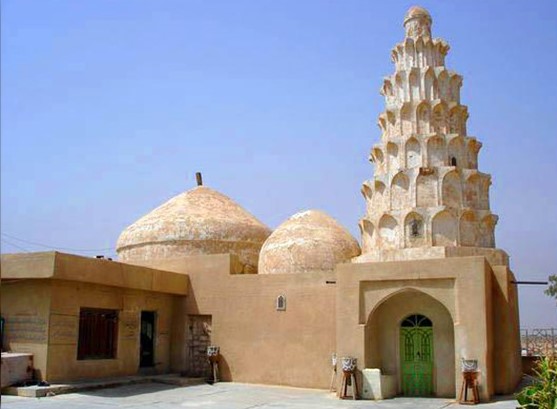His Life and Spiritual Struggle
Sayyid al-Ghawth Sheikh ʿAbd al-Qadir al-Kasnazani—may God sanctify his secret—was known for his tireless spiritual struggle (jihād) and countless miracles. A true Ghawth—a saintly refuge—he was renowned for his patience, generosity, and deep compassion, particularly toward orphans, whom he cared for with complete devotion, in accordance with the divine command:
“So do not oppress the orphan.”
(Qur’an 93:9)
During the First World War, the Ghawth migrated with his family and a group of disciples to Iran, at a time when many people had grown heedless of their religious duties. With his arrival, the light of this great saint spread across the land, illuminating the region. He rekindled the flame of faith, revived the spirit of Islam, and taught the people the noble character, blessed traditions, and righteous actions of the Messenger of Allah ﷺ. As a result, the lights of the Ṭarīqah (Sufi path) spread throughout Iran.
He remained there until his passing in 1340 AH (1921 CE). Due to this migration, he was honored with the title: “The Migrating Ghawth in the Cause of God,” following the example of his ancestor, the Chosen Prophet ﷺ, who migrated from Mecca to Madinah.
After his passing, the leadership of the Ṭarīqah was entrusted to his son, Sayyid al-Ghawth al-Sultan Ḥussein al-Kasnazani—may God sanctify his secret. At the sincere request of his disciples, his blessed body was returned to Iraq and buried in the village of Karbejnah.
His Sayings and Teachings
Among his many wise sayings and admonitions—may God sanctify his secret—are the following:
“O disciple, wear the robe of repentance—a garment that is pure and clean. Whoever is not committed to the Sacred Law (Sharīʿah), realized in truth, and chaste—is not one of our disciples. Our followers must be firmly grounded in the Sacred Law, the Path, asceticism, piety, and detachment from greed.”
“Whoever restrains his anger and forgives those who wrong him, God will elevate him to the ranks of the true men.”
“If you are determined to backbite, then backbite your parents—for they are more deserving of your good deeds than others.”
“Beware of false claims, for they darken the face and blind the sight. Let none among you claim sainthood while engaging in base actions—feeding off wealth acquired through bribery, usury, and injustice. One who lies, slanders, and spreads discord among people cannot be among the righteous. How can one seek nearness to God while entangled in such misguidance? Beware of claiming spiritual leadership while persisting in disobedience. God will say: ‘Are you not ashamed to claim closeness to Me while you have not even purified your defiled garments for My company? You fill your belly with the forbidden and walk toward sin—yet you claim what is false.’”
His Piety (Waraʿ)
Among the signs of his deep piety was his conduct while living in an Iranian village that had been unjustly seized from a poor family by a feudal lord. Out of scrupulousness, he refrained from using the village’s water or consuming anything derived from it. Instead, he relied solely on snowmelt throughout his years of residence there, considering the village’s resources unlawfully taken.
His Miracles (Karāmāt)
▪ The Transformation of a Tyrant
A tyrannical landowner once assaulted a man from the noble family of the Prophet ﷺ. The wronged man sought the Sheikh’s help. The Ghawth responded:
“Be patient, for God delays but does not neglect. God is ever watchful over every oppressor.”
Not long after, the oppressor’s body was transformed: his voice changed, and his features took on a completely different form. No remedy could restore him. In despair, he returned to the Sheikh crying:
“This is your doing, O Sheikh! I wronged that man.”
The Sheikh replied:
“Repent sincerely to God and never return to injustice—for God is Most Forgiving, Most Merciful.”
After sincere repentance, the man was restored to his original form.
▪ The Stolen Cow
A poor man had his cow stolen by a feudal oppressor. When he turned to the Sheikh, the latter advised the oppressor to return it. The man arrogantly replied:
“I will not return property to people like him—they are nothing more than slaves to us.”
The Sheikh, deeply angered, replied:
“People are equal like the teeth of a comb. There is no superiority of rich over poor, master over servant—except through piety. Indeed, the most honored of you in the sight of God is the most righteous.”
(Qur’an 49:13)
“As for you—your condition will not improve until a horn grows from your head and you eat from the waste of dogs. Go—for God is the Avenger.”
Soon after, the oppressor fell ill. Horns grew from his head, his scalp festered, and he cried in regret:
“Take me to Sayyid Sheikh ʿAbd al-Qadir al-Kasnazani! This is his doing!”
When brought to the Sheikh, he begged:
“O descendant of the Prophet ﷺ, heal me!”
The Sheikh replied:
“Repent sincerely and restore all that you have wrongfully taken. If you do so, you will be healed, God willing.”
Upon fulfilling his vow, he was cured.
▪ The Russian Convert
A man from the Soviet Union saw the Sheikh in a dream and felt a deep spiritual attraction. He traveled toward Iraq, guided along the way by luminous signs. Upon reaching Sulaymaniyah, he was arrested by the followers of Sheikh Maḥmūd al-Ḥafīd and accused of espionage. He was sentenced to death.
Before the sentence was carried out, Sheikh Maḥmūd saw Sheikh ʿAbd al-Qadir in a dream, commanding him to release the man, for he was one of his spiritually attracted disciples. He was immediately released and brought to the Ghawth, at whose hands he embraced Islam. The Sheikh named him Sayf Allah (Sword of God) and taught him the religion and the Ṭarīqah. His descendants remain in Sulaymaniyah, and his official name became “Sayf Allah Sheikh Qadir.”
▪ The Resurrected Bird
While walking with his disciples, the Sheikh came across a dead bird. He asked for it to be brought to him and said:
“It is not dead—it has merely forgotten its glorification.”
He whispered into its ear, blew upon it—and the bird flew away.
▪ The Complaint of the Ox
A farmer returning from his field with his oxen had one of them stray toward the Sheikh. The animal lowered its head as if making a complaint. When the owner arrived, the Sheikh said:
“This ox is complaining that you overburden it beyond its capacity. Be kind to it.”
This, the Sheikh taught, is true mercy—extending compassion even to the weakest among God’s creatures.
Source:
Sayyid Sheikh Muḥammad al-Kasnazani, The ʿAliyyah Qādiriyyah Kasnazāniyyah Path, p. 346.




